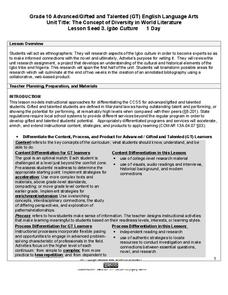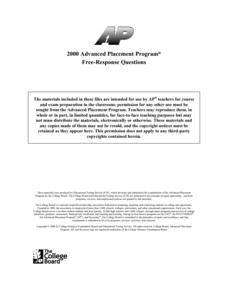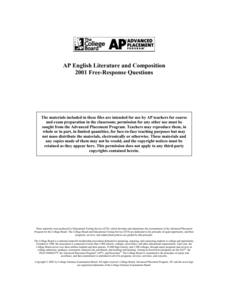Virginia Department of Education
Identifying the Main Idea in Fiction
Discovering the main idea in fiction is like uncovering buried treasure; one must persevere to locate it, and the reward is priceless. Scholars delve deep into leveled stories using three questions to aid in identifying the main idea.
Curated OER
Responding to Literature
Your class will create a four section flip book and write titles for characters, setting, problem, and solution. They will also draw a picture to show what they wrote about.
Curated OER
Three Skeleton Key: Elements of Literature
Rats! How are they described in "Three Skeleton Key," and what happens to the characters in the story? Study the vocabulary and the story with these worksheets. Learners complete pre-reading activities, study vocabulary, complete...
Shoop English
Literature Terms Activity
Designed to be used with an independent reading book, this activity provides practice with identifying and explaining literary terms. While they read, individuals find instances of literary devices and elements in use in their books....
Maryland Department of Education
The Concept of Diversity in World Literature Lesson 10: Author's Purpose Seminar
Why did Chinua Achebe write "An Image of Africa: Racism in Conrad's Heart of Darkness" in response to Conrad's novel? As part of a study of Things Fall Apart, class members conduct a socratic seminar focused on Achebe's purpose and...
Maryland Department of Education
The Concept of Diversity in World Literature Lesson 9: Debating Imperialism
To gain an understanding of Imperialism, class members read Rudyard Kipling's poem, "The White Man's Burden" and Mark Twain's essay, "To the Person Sitting in Darkness." Groups compare these perceptions of non-white cultures with the...
Maryland Department of Education
The Concept of Diversity in World Literature Lesson 8: Nonfiction Close Reading
As part of their study of Things Fall Apart, class members conduct a close reading of a section of Chinua Achebe's essay, "An Image of Africa: Racism in Conrad's Heart of Darkness." Jigsaw groups then compare the voice in the essay...
Maryland Department of Education
The Concept of Diversity in World Literature Lesson 3: Igbo Culture
What cultural concepts must readers understand in order to connect to Things Fall Apart? As part of their study of Chinua Achebe’s novel, class members research Nigeria and the Igbo culture to create a collaborative, web-based, annotated...
Maryland Department of Education
The Concept of Diversity in World Literature Lesson 4: Proverbs
"Eneke the bird says since men have learnt to shoot without missing, he has learnt to fly without perching." As part of their study of Things Fall Apart, class members read Paul Hernadi and Francis Steen's essay, "The Tropical Landscapes...
College Board
2006 AP® English Literature and Composition Free-Response Questions Form B
It is not about where you are going, but the journey to get there. Scholars choose a play or novel in which a character takes a journey. They then create essays describing what the journey meant to the overall piece of work. Learners...
College Board
2007 AP® English Literature and Composition Free-Response Questions Form B
Does a love for reading begin early in life? Scholars write essays using a passage from Seamus Deane in which he wrote about his childhood experiences with reading and books. They also create essays that focus on betrayal and elements in...
College Board
2008 AP® English Literature and Composition Free-Response Questions Form B
Ever wondered what your dog is thinking? Scholars take a close look at two poems written through the eyes of animals and then create essays analyzing each author's technique. Pupils also read a passage to write about the literary...
College Board
2009 AP® English Literature and Composition Free-Response Questions Form B
Do you have a political agenda? Some authors do. Scholars analyze a piece of work and determine how the author deals with a political or social issue. Responding to two other essay questions, writers create essays exploring how authors...
College Board
2011 AP® English Literature and Composition Free-Response Questions Form B
It's all in the technique. Authors use many techniques to express themselves using writing. Two of the three essay questions require scholars to analyze the literary devices used by the authors and write essays about how these techniques...
College Board
1999 AP® English Literature and Composition Free-Response Questions
Have you ever felt like you are pulled into two directions? Some authors depict this feeling in their characters. Scholars choose a play or novel in which a character is pulled or influenced by two different directions and write essays...
College Board
2000 AP® English Literature and Composition Free-Response Questions
Everyone enjoys a good mystery. Learners create essays explaining how a mystery gives meaning to a novel or play of their choice. They also examine the use of literary elements of diary entries in The Spectator. A third essay question...
College Board
2001 AP® English Literature and Composition Free-Response Questions
Do 100 years make a difference? Scholars compare two poems written 100 years apart. They also analyze characterization used in a passage from Tom Jones by Henry Fielding. A final essay question allows writers to choose a piece of work...
College Board
2002 AP® English Literature and Composition Free-Response Questions
Good or evil? Some characters never identify themselves as either. Scholars create essays in which they examine morally ambiguous characters. Writers also analyze and write essays about the use of poem titles and take a close look at the...
College Board
2002 AP® English Literature and Composition Free-Response Questions Form B
Is there a secret to keeping secrets? Scholars choose a character in a novel or play and analyze how the character keeps a secret. Writers also craft essays to reveal elements of poetry and the use of language in a passage. The prompts...
College Board
2003 AP® English Literature and Composition Free-Response Questions Form B
Ever felt stuck in the middle? Some characters do. Scholars choose a novel or play and write essays describing how a character is stuck between cultures. Writers also analyze the techniques used in a passage from We Were the Mulvaneys...
College Board
2003 AP® English Literature and Composition Free-Response Questions
The released 2003 AP® exam asks scholars to read and respond to two poems about the love god Eros. They also analyze the characterization and narrative in The Other Paris. A final essay question requires pupils to choose a novel or play...
College Board
2004 AP® English Literature and Composition Free-Response Questions
Have you ever felt left in the dark? Scholars write essays after analyzing two poems pertaining to night and darkness. Pupils also read a passage and write an essay discussing the author's depiction of characters. A third essay allows...
College Board
2005 AP® English Literature and Composition Free-Response Questions
Santa is not the only one in the chimney! Scholars compare two poems written about using children as chimney sweepers. They also create essays about literary devices in a passage and about a character's struggle with inward and outward...
College Board
2006 AP® English Literature and Composition Free-Response Questions
Scholars select a novel or play and then craft an essay that describes the setting's role in the story. Pupils also create essays that analyze a poet's use of language and the values of characters in a novel excerpt.
Other popular searches
- Spanish Art and Literature
- Literature and Art
- Visual Art and Literature
- Chinese Art and Literature
- Art and Literature Acre
- Art and Literature Acroi
- Art, Literature and Science
- Art Literature and Science
- Multicultural Literature Art
- Art and Literature Connection

























